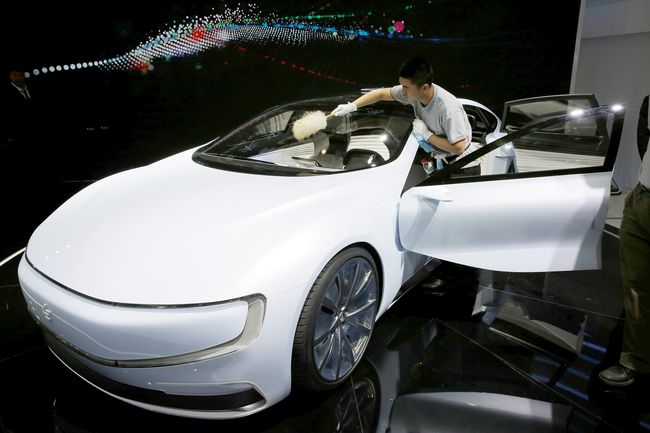Digital future of the world
What is China’s vision of it?
Where the Ukrainians see the glowing sign of 3G on their smartphones, the Chinese will soon see 5G, a new generation of mobile communication. It can be used even on super-high-speed trains. The future, together with the achievements of a digital economy, is coming to China faster than anywhere else.
Ukraine recently signed with China a framework agreement on building a digital economy. Also known as internet economy, it is based on digital computerized technologies. Its important components are e-commerce, telecoms, social media, etc.
LIVING IN “SMART CITIES”
The arrival in China resembles a jump into the future. The airport is situated in one of the 500 Chinese cities that apply Smart City technologies. This up-to-date technology, which is supposed to improve the quality of life in the city, is based on the integration of information and communication systems into certain structures.
Once you are in the Huawei-guided Shenzhen or Hangzhou, where City Brain functions, you can see a well-known brainchild of the company Alibaba in action. Last October 128 traffic lights on Hangzhou’s 100 crossroads were connected to the system. Developers are sure that one will be able soon to see their success with his or her own eyes – the number of traffic jams and accidents and even the level of air pollution will decrease.
How does it work? The Smart City system is based on the technologies of artificial intelligence (AI) and internet of things (IoT). The internet of things is a network of devices linked between themselves and the internet. AI watches the traffic in real time and can detect a traffic accident in a second. The information about this is instantly sent to the police, and they will arrive in 5 minutes’ time.
Every second, the system processes a huge array of data, the largest suppliers of which being the so-called BAT – three internet giants of the country: Baidu, Alibaba, and Tencent. Nobody asks people here if they agree to the processing of their personal data, but the Chinese are not much worried about this.
ARTIFICIAL INTELLECT ECONOMY
The 4th World Internet Conference (WIC), held in the Chinese town of Wuzhen in December 2017, heard the latest report on the internet’s international development, which says that the digital economy in China accounts for 30 percent of GDP, or 3.4 trillion dollars. By this indicator, China is second in the world after the US. It generates 13 percent of the global digital information and will do 25 percent by 2020. Out of 3.9 billion internet users in the world, 751 million are in China. Owing to the scale and dynamic of its startups, China will become the leader in gathering decision-making informative data. For it possesses sufficient resources to establish an AI-based economic model.

Local IT companies will help in this by opening research centers and investing substantial funds in technologies. Alibaba, the largest Chinese high-tech company that owes its success to artificial intellect, plans to invest over 15 billion dollars in their development. They have also created their own online ecosystems which are more and more becoming part of the population’s daily routine. It is Taobao, the largest electronic commerce platform, and search engines Baidu and Youku Tudou which copy YouTube in many respects. Some of them are more effective than their US analogues, such as eBay or WhatsApp, because they have more useful functions. For example, the WeChat messenger’s electronic wallet of the company Tencent allows almost 500 million Chinese to give up using cash.
TALKING TO AUTOMOBILES
The automobile industry is becoming an important part of the digital economy. Many experts are convinced that China will take the leading positions in this segment. Firstly, many big internet companies are developing today an interconnected and “smart” transport. Secondly, Chinese consumers easily accept new technologies. The interconnected autos are linked to internet and local networks. And some “smart” makes of the Geely auto-making giant can even talk with drivers and passengers in various Chinese dialects.
The practicability and effectiveness of these designs was proved on the roads of Shanghai in November 2017 by a special attachment that ensures interconnection of autos between themselves and the infrastructure. This attachment furnishes drivers with information about the recommended speed with which you can pass the green light at the next crossroads. It thus helps improve the transport flow and reduce jams.
5G IN SMARTPHONES
China is becoming a pioneer on the global arena of telecoms. One of the large-scale projects is introduction of the 5G communication. According to the company Qualcomm’s report, this will create an estimated 22 million jobs by 2035.
The world’s largest 5G test platform is located in Beijing, where about 30 base telecom stations were built. China Mobile, ZTE, Huawei, and a number of foreign hi-tech companies have already finished the second stage of tests. China is now hasting to finish the third stage and may soon make the first, so far noncommercial, 5G product. Nevertheless, local companies, spearheaded by Huawei, are already rushing to compete for a tasty morsel of its commercialization.
Explaining the fundamental difference between 5G and 4G, Huang Yuhong, DGM of the China Mobile Research Institute, says the new communication will be not just a technology or a system. On the contrary, it will be a platform on which telecom industries will be closely linked with other sectors.
DIGITAL CONSTELLATION
“One Belt, One Road” is the most high-profile Chinese project of the past few years, which is aimed at improving regional cooperation between the countries situated on the ancient Silk Road that used to link China and Europe. In 2018 this initiative came up with one more infrastructural project – digital BeiDou (“Great Bear” in Chinese), the Chinese system of satellite navigation that is supposed to cover 60 countries. And by 2020, China is going to embrace the whole world with 35 satellites. The precision of BeiDou place identification, up to 10 meters, is so far worse than that of its American rival GPS. But China wants to make it even a better navigation system. To do so, it should establish a faster and more effective communication and improve navigational services.
For this purpose, 25 billion dollars will be earmarked from the budget, while 30 countries have already signed an agreement to use the system. Millions of the Chinese owners of bicycles and mopeds equipped with BeiDou smartphones spot their geo-location with this system, and more than 40,000 fishing vessels use it for communication.
HOME-DELIVERED THAI DURIAN
Another breakthrough will be a new window of e-commerce, also introduced as part of the “One Belt, One Road” project. Chinese consumers will no longer have to travel abroad to buy Belgian chocolate or Thai durian. They will be able to buy all this, sitting on the sofa at home. Thanks to this, dealers and consumers will find it profitable to trade in high-quality goods and services at reasonable prices.
Based on online platforms, this initiative embraces all the components of successful international trade – storage, logistics, funding, taxes, etc., thus creating a global digital network. Many electronic platforms, including Alibaba and JD.com, are already actively preparing to join this initiative which opens them vast opportunities.
Of course, e-commerce was and still is the foundation stone of the digital economy in China. According to the international consulting company McKinsey, China holds the world’s largest segment – 40 percent – of the world electronic commerce market. This indicator was a mere one percent only 10 years ago.
What can be a vivid illustration is Singles’ Day which unmarried people traditionally observe in China on November 11. At the same time, it is also a holiday for internet trade as a whole because most of the shopping is done on this very day. During the World Economic Forum in Davos, Jack Ma said that Alibaba had tested on this day a new technological system which managed to withstand several hundred thousand users: 270,000 transactions per second passed through the website on that day!
WINS AND LOSSES
China is proud of its outstanding scientific and technological achievements in a wide range of fields, including 3D printing, nanotechnologies, and robotization. It can boast of Shenzhen, also known as second Silicon Valley. The number of hi-tech startups registered in its free economic area is growing in a geometric progression.
But everything is not as good as it may seem at first sight. In 2014 China spent more than 2 percent of GDP on research and development, but it lags far behind the largest innovators – the US and Japan. According to the Organization for Economic Cooperation and Development, basic research accounts for only 5 percent of these expenditures (compared to 18 percent in the US and 12 percent in Japan).
Another problem is that most of the Chinese patents belong to the categories of design and service programs, whereas only a small number of them are real inventions. Besides, only a part of Chinese patents are registered in the US, the EU, or Japan, and, therefore, local researchers are insufficiently linked with global networks. There is no improvement in the situation with constant infringements of intellectual property rights, which in general restricts the registration of patents. Two thirds of the local companies are sure that the patent law will not protect their inventions from being copied by other rivals.
It should not be forgotten that the Great Chinese Firewall (system of internet content filtration) had not vanished, and we are facing today the danger of a complete closure of all VPNs which recently became accessible to some Ukrainians. The VPN is needed to gain access to global (often banned in China) websites and networks. The absence of VPNs will extremely complicate the life of foreigners in China. One more part of the sovereignization of the Chinese internet space is a directive to keep large arrays of data in cloud storages only. In a word, since the internet emerged, love and fear of it have been strangely intertwined in the Celestial Empire.
We in Ukraine must understand the vital necessity of switching to a digital economy. It can cause an economic leap forward and a more than 20-percent growth of GDP – on condition it is introduced on a comprehensive basis. At present, the digital infrastructure is almost undeveloped in Ukraine. The syndrome of “obsolete technologies” and cyber attacks is our sad reality. Nevertheless, digital transformation of the old economic sectors, access of every Ukrainian to the fast internet, and public knowledge of digital technologies may also pave the way to a digital future in Ukraine.
Svitlana Pryzynchuk, an Orientalist, worked as secretary at the office of the Economic Advisor at the Chinese Embassy in Ukraine
Newspaper output №:
№16, (2018)Section
Society





